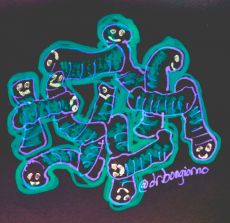
Depression
The Gut Microbiome, Anxiety and Depression: 6 Steps to Take
How balancing your intestinal bugs brings balanced mood.
Posted November 8, 2014

Impressive new research is emerging every day regarding the role of the microbiome of the digestive tract lining. The microbiome refers to the healthful bacteria, or ‘good germs’ that line our digestive tracts. The digestive tract itself is a center point of the nervous system, hormonal system and immune system. It is responsible for the balance of the our molecules of emotion, the neurotransmitters, and as a result is an important player for best mood. And good bacteria is an important part of healthy digestion. Probiotics are known not only to help the digestion, but are key factors in obesity, hormonal balance, healthy kidney function, and much more.
How Do Probiotics Help the Brain?
Medical research is uncovering the mechanism of probiotics in mood. These healthy germs boost mood in two important ways: they generate a particular neurotransmitter called gamma-aminobutyric acid (GABA) and also enhance the brain receptors for GABA as well. Like a warm and gentle blanket for the brain, GABA is calming amino acid, known to calm areas of the brain that are over active in anxiety and panic and in some forms of anxious depression.
Animal studies working with mice showed those mice who ingested probiotics were, in general, more chilled out than the control mice. The probiotic mice had lower levels of corticosterone in response to stress. Corticosterone is the mouse version of the human stress hormone cortisol. High levels of cortisol are common in anxiety as well as depression. These mice were fed either the probiotic strain Lactobacillus rhamnosus or a broth without these. The lactobacillus-fed animals showed significantly fewer stress, anxiety and depression-related behaviors than those fed with just broth (Bravo et al., 2011).
Human studies have also corroborated these murine (mouse) findings. A French team learned via a double-blinded, placebo-controlled, randomized parallel group study that giving humans specific strains of Lactobacillus and Bifidobacterium for 30 days yielded beneficial psychological effects including lowered depression, less anger and hostility, anxiety, and better problem solving, compared with the placebo group (Messaoudi et al., 2011).
Yeast and the Microbiome
While a healthy microbiome will contribute to good mood, an unhealthy one full of Candida albicans (yeast), and all the toxins associated with it, may also contribute to mood disorder. Presence of yeast will alter the ability to absorb nutrients and push hypersensitivity reactions of toxin by-products which translates to inflammation in the body. Inflammation will greatly contribute to depression, anxiety and poor mental function (Rucklidge, 2013).
Unhealthy microbiome → yeast buildup → toxic byproducts → hypersensitivity reactions → inflammation → mood problems (anxiety and depression)
What You Can Do To Keep Your Microbiome Healthy?
Steps you can take for a healthy microbiome and mood are:
1 – Avoid excess sugary foods: to avoid yeast build up.
2 – Good Quality Sleep: good sleep is key for the intestinal lining to repair and create a healthy microbiome.
3 – Meditation and Relaxation: Meditation and quality down time is important to keep the body in the ‘rest and digest’ mode instead of stress mode. Stress mode shuts circulation to the gut, which doesn’t allow a healthy microbiome.
4 – Eat Foods with Fiber: Good fiber helps feed the good bacteria and keeps them healthy. Vegetables, fruits, psyllium, flax, inulin and other fibers also help keep good flora and proper balance of short chain fatty acids in the intestines.
5 – Eat Probiotic Foods: While the French study mentioned above used a supplement, there are also many wonderful natural foods full of probiotics. In my opinion, foods, over supplements, are always the best way to go for long term health. These include natto (a traditional Japanese fermented food), kim chi (Korean style cabbage), sauerkraut, yogurt, kefir, tempeh, fermented milk (like buttermilk), miso, and non-baked cheeses (like aged cheese). Homemade sauerkraut is better than store bought, for the store bought stuff is pasteurized, which kills some of the good probiotics.
6 – Consider a probiotic supplement: For patients with health issues, sometimes it makes sense to use a supplement along with foods. A good quality supplement should contain with Lactobacillus and bifidus bacteria. There are a number of good ones on the market and some that are poorly made, so if you choose to take a supplement, make sure the manufacturer is of the highest quality in terms of raw materials, culturing techniques, and quality control. My clinic uses Restoraflora, which contains about 4 billion bacteria per capsule. If you purchase one in the store, find a refrigerated version that doesn't have any binders, fillers, milk products, or corn.
Peter Bongiorno, N.D., L.Ac.,

Peter Bongiorno, N.D., L.Ac.,
Please follow me on twitter: @drbongiorno
References
Bravo JA, Forsythe P, Chew MV, Escaravage E, Savignac HM, Dinan TG, Bienenstock J, Cryan JF. Ingestion of Lactobacillus strain regulates emotional behavior and central GABA receptor expression in a mouse via the vagus nerve. Proc Natl Acad Sci U S A. 2011 Sep 20;108(38):16050-5
Messaoudi M, Lalonde R, Violle N, Javelot H, Desor D, Nejdi A, Bisson JF, Rougeot C, Pichelin M, Cazaubiel M, Cazaubiel JM. Assessment of psychotropic-like properties of a probiotic formulation (Lactobacillus helveticus R0052 and Bifidobacterium longum R0175) in rats and human subjects. Br J Nutr. 2011 Mar;105(5):755-64.
Rucklidge JJ. Could yeast infections impair recovery from mental illness? A case study using micronutrients and olive leaf extract for the treatment of ADHD and depression. Adv Mind Body Med. 2013;27(3):14-8.



